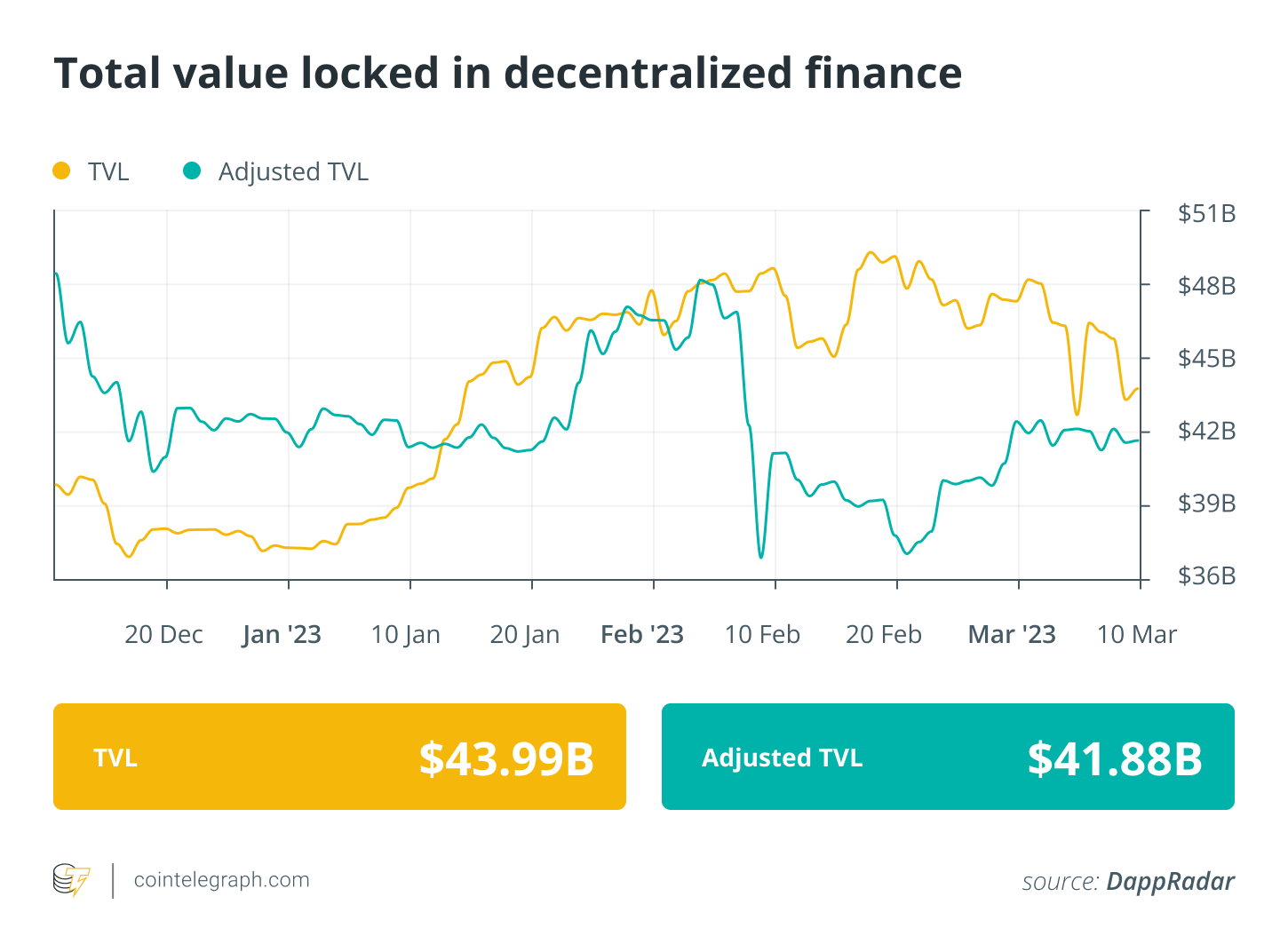Welcome to Finance Redefined, your weekly dose of essential decentralized finance (DeFi) insights — a newsletter crafted to bring you significant developments over the last week.
DeFi has become a prominent choice for investors after multiple centralized finance (CeFi) collapses throughout 2022. Some key interest areas for investors include “NFTfi,” on-chain derivative platforms, decentralized stablecoins and Ethereum layer 2’s.
February saw seven DeFi exploits resulting in a net loss of about $21 million. March is no different, with multiple exploits already recorded, such as on Hedera’s mainnet. DeFi lender Tender.fi was exploited, but the white hat hacker that drained $1.59 million returned the funds.
Tornado Cash developers said that a new version of the mixing tool would aim to be more regulator friendly, where law enforcement can differentiate between the legal and illegal transfer of funds.
The DeFi market had a bearish past week, with most of the tokens in the top 100 trading in the red thanks to the new federal budget and Fed rate hike.
Crypto funding shifting from CeFi to DeFi after major collapses: CoinGecko
Digital asset investment firms poured $2.7 billion into decentralized finance projects in 2022 — up 190% from 2021 — while investments into centralized finance projects went the other way — falling 73% to $4.3 billion in the same timeframe. The staggering rise in DeFi funding came despite overall crypto funding figures falling from $31.92 billion in 2021 to $18.25 billion in 2022.
According to a March 1 report from CoinGecko, citing data from DefiLlama, the figures “potentially point to DeFi as the new high growth area for the crypto industry.” The report says the decrease in funding toward CeFi could point to the sector “reaching a degree of saturation.”
7 DeFi protocol hacks in Feb, with $21 million in funds stolen: DefiLlama
Reentrancy, price oracle attacks and exploits across seven protocols caused the DeFi space to bleed at least $21 million in crypto in February.
According to DeFi data analytics platform DefiLlama, one of the largest in the month was the flash loan reentrancy attack on Platypus Finance, resulting in $8.5 million of lost funds.
DeFi lender Tender.fi suffers exploit — White hat hacker returns funds
An ethical hacker drained $1.59 million from the DeFi lending platform Tender.fi, leading the service to halt borrowing while it attempts to recoup its assets.
Web3-focused smart contract auditor CertiK, and blockchain analyst Lookonchain, flagged an exploit that saw funds drained from the DeFi lending protocol on March 7. Tender.fi confirmed the incident on Twitter, citing “an unusual amount of borrows” through the protocol.
Hedera confirms exploit on the mainnet led to the theft of service tokens
Hedera, the company behind distributed ledger technology, Hedera Hashgraph, has confirmed a smart contract exploit on the Hedera mainnet, which led to the theft of several liquidity pool tokens.
Hedera said the attacker targeted liquidity pool tokens on decentralized exchanges (DEXs) that derived their code from Uniswap v2 on Ethereum, ported over for use on the Hedera token service.
Tornado Cash dev says ‘sequel’ to crypto mixer aims to be regulator-friendly
A former Tornado Cash developer claims to be building a new crypto mixing service to solve a “critical flaw” of the sanctioned crypto mixer, hoping to convince United States regulators to reconsider its position on privacy mixers.
The code of a new Ethereum-based mixer, “Privacy Pools,” was launched on GitHub on March 5 by its creator, Ameen Soleimani.
In a 22-part Twitter thread, Soleimani explained that the “critical flaw” with Tornado Cash is that users cannot prove they’re not associated with North Korea’s Lazarus Group or any criminal enterprise.
DeFi market overview
Analytical data reveals that DeFi’s total market value dipped below $45 billion this past week. Data from Cointelegraph Markets Pro and TradingView shows that DeFi’s top 100 tokens by market capitalization had a bearish week, with most of the tokens trading in red, barring a few.

Thanks for reading our summary of this week’s most impactful DeFi developments. Join us next Friday for more stories, insights and education in this dynamically advancing space.




